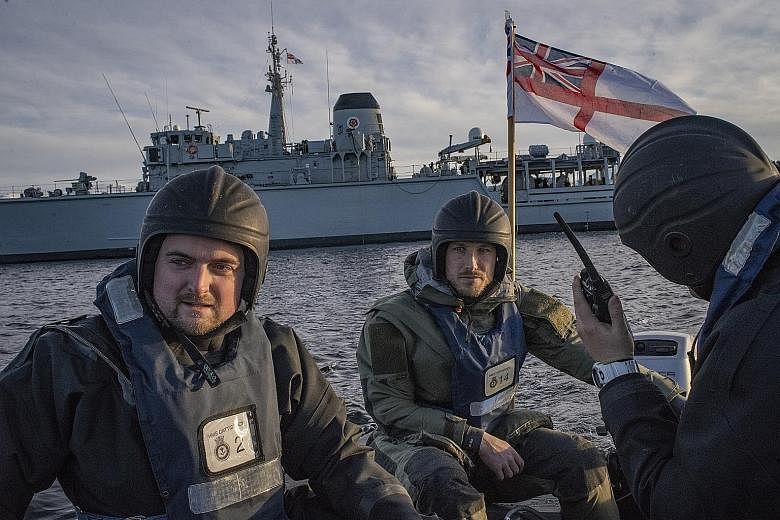NARVA (Estonia) • On Nato's border with Russia, soldiers with Britain's Yorkshire Regiment recently joined Estonians in a celebration of the 100th anniversary of the Royal Navy's critical intervention in the country's battle for independence against the Bolsheviks. Schoolchildren clambered over a Challenger 2 battle tank, an AS-90 artillery gun and an armoured personnel carrier.
To all appearances, it was a stirring reminder of Britain's commitment to European defence, Brexit or no Brexit.
But the battalion, based in Estonia as part of Nato's response to Russia's invasion of Crimea in 2014, is the polished surface of a hollow shell - a British military badly damaged by austerity and political choices that have consistently favoured symbol over substance in a struggle to remain a global power.
For a military that once spanned the globe, this squad of some 1,000 troops and assorted armour represents the largest British battle group deployed anywhere in the world. Budget cuts have led to sharp reductions in troops, equipment and investment, and analysts warn that Britain is no longer capable of defending its homeland by itself.
Britain remains a nuclear power and a member of the United Nations Security Council. It is one of the few countries able to fight on land, sea and air, and its intelligence capability is world-class. In a post-Brexit world, should that come about, Britain's role as a military power will be vital to its self-image, its geopolitical clout and its relationship with the United States.
But the budget cutbacks have contributed to growing doubts in Washington about whether Britain remains capable of fighting a war alongside the US military.
The British House of Commons Library assessed that in real terms, between 2010 and 2015, Britain's defence budget fell by £8 billion (S$14 billion), a cut of 18 per cent compared with the 2009-10 budget. The budget has stabilised since then, but has not grown significantly.
-
$14b
-
How much Britain's defence budget fell by between 2010 and 2015, a cut of 18 per cent compared with the 2009-10 budget. The budget has stabilised since then, but has not grown significantly.
Experts say France is gradually supplanting Britain as the leading European military ally of the US, further weakening the "special relationship" between Britain and America - a deep concern at a time when Brexit and the isolationism of US President Donald Trump are weighing on British security officials.
"Over the last 10 years, there is a steady decline of Britain as the partner of first choice for the US military," said former US assistant secretary of defence for international security affairs Derek Chollet.
Britain has fought alongside US troops in Iraq and Afghanistan, and joined the fight against the Islamic State in Iraq and Syria. But "the forever wars" have badly sapped British equipment and morale, and have deeply damaged faith in the judgment of the US. There is waning public appetite for military adventures.
Perhaps most telling of Britain's lower military status, the last three formal defence reviews have been predicated on the assumption that Britain will never again fight a war without the United States.
In an interview, Defence Secretary Gavin Williamson spoke proudly of securing another £1 billion over the next two years for a military budget that would total £38.4 billion in fiscal 2020. That represents 2.1 per cent of gross domestic product, just over Nato's guideline of 2 per cent, although since 2015 it includes spending for military pensions and intelligence.
Britain cannot have "the scale or the mass" of the US, he said. "But we are the only other country in Nato that can lead the way the US can lead, the only country in Europe that has the full range of capabilities."
Last June, the House of Commons Defence Committee called for an extra £20 billion in military spending, up to 3 per cent of GDP, a recommendation unlikely to be met.
It is not just the level of spending, however, that is hurting the British military. More important is how the money is being spent. The expenditures focus on two projects: replacing four ageing nuclear missile submarines and building two world-class aircraft carriers, with all the ships, planes and submarines required to protect them and the F-35B fighter jets to put on them.
The combined impact of austerity-era cutbacks and spending choices has hit the British army the hardest of all the services. Now smaller than at any time since Waterloo, it has failed to meet even modest recruitment goals, in part because of an embarrassing effort at outsourcing.
It is still several thousands short of its goal of 82,000 "fully trained regular army soldiers", despite downgrading what it means to be "fully trained", as well as falling short of its goal of 30,000 in the army reserve.
In other areas of modern warfare, however, Britain's capacities are more highly regarded, especially in cyber-defence and cyber-offence, intelligence and space.
Lieutenant-Colonel Tom Tugendhat of the army reserves, who served in Iraq and Afghanistan and is now chairman of Parliament's Foreign Affairs Committee, said: "The fundamental problem in defence is always personnel. Our army and navy are too small, and our reserves are not even vaguely close to being fully manned", partly because of the new carriers and nuclear submarines.
NYTIMES

